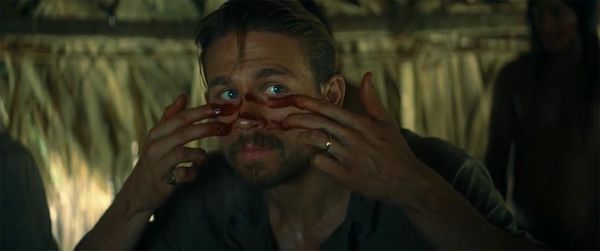Eye For Film >> Movies >> The Lost City Of Z (2016) Film Review
The Lost City Of Z
Reviewed by: Seph Shewell Brockway

This adaptation - written and directed by James Gray - of David Grann’s book of the same name, in telling the true story of Lieutenant Colonel Percy Fawcett’s three expeditions to the rainforests of Bolivia, explores the conflict between family life and all-consuming obsession, and takes its audience from the depths of the jungle to the horror of the trenches of the Somme.
The film is slow to get moving and the first 20 minutes, introducing then-Major Fawcett (Charlie Hunnam), his wife Nina (Sienna Miller) and son Jack (Tom Mulheron; portrayed later in the film by Bobby Smalldridge and as a teenager by Tom Holland) are spent in Fawcett’s posting in rural Ireland. This sequence does little to advance either plot or characters, and the pacing would be improved by shortening it. At one or two points the film seems to be setting up plot elements - Nina’s suggestion that she join her husband on his next trip, for example - which are then left unresolved.

Hunnam gives a compelling performance as a man railing against the bigotry of his time and yet simultaneously embodying it as a white explorer in a place already well-known to its inhabitants. Miller also portrays the complexity of her character with aplomb, and the two leads have an on-screen chemistry which adds poignancy to Fawcett’s predicament, torn between a family that he loves and a quest that has become an obsession.
Robert Pattinson’s portrayal of Henry Costin, Fawcett’s principal companion on his first two expeditions, is decent enough, but looks a bit lacklustre in comparison to Hunnam and Miller. Tom Holland gives a strong performance as Jack Fawcett, who accompanies his father on his last expedition.
Darius Khondji’s cinematography is strong throughout, with great sensitivity to landscape and colour. Worth particular attention is the depiction of the First World War - which breaks out between Fawcett’s second and third voyages - including a harrowing depiction of a gas attack. The entire film has a slightly surreal quality, as if reflecting the protagonist’s debatable sanity, a sensation that is amplified by Christopher Spelman’s very spare score, leaving the audience with nothing between us and the sounds of the jungle.
This is an entertaining and thought-provoking piece of cinema, and well worth a watch.
Reviewed on: 22 Feb 2017


















